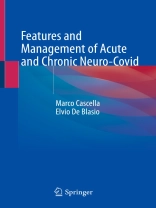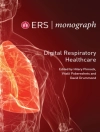This book delineates that COVID-19 is a multisystem inflammatory disease and how its pathophysiology can predispose patients to an increased risk of neurological problems. Available data suggest the potential neuroinvasive capacity of the SARS-Co V-2 through direct viral damage and indirect entering the CNS by different routes including the vascular system, the olfactory and trigeminal nerves, the cerebrospinal fluid, and the lymphatic system. Furthermore, the pro-inflammatory cytokine storm and oxidative stress can induce microglial activation and damaging the blood-brain barrier, culminating in widespread neuroinflammatory processes. This acute neurotoxicity is clinically expressed as anosmia, ageusia, headache, nausea and vomiting. Other neurologic manifestations such as acute cerebrovascular diseases, encephalitis-based impaired consciousness, and meningitis are also described.
The PNS can also be affected and clinical manifestations including Guillain-Barré syndrome, polyneuritis, Miller Fisher Syndrome, and other problems are described. A special issue concerns the neurocognitive dysfunction and altered consciousness manifested as delirium, agitation, and confusion. Non-specific symptoms such as dizziness, and seizures can accompany clinical pictures.
Regardless of the admitting diagnosis, a high percentage of patients discharged from ICUs develop disabilities affecting physical, cognitive and psychological activities. The symptoms such as asthenia, memory disturbances, depression, sleep disturbances, anxiety, and Post-traumatic Stress Disorder (PTSD), can configure the so-called Post-intensive Care Syndrome (PICS). Multimodal management during the ICU stay and implementation of follow-up programs on patient discharge can reduce the incidence of this syndrome, improving the quality of life of surviving individuals.
In this complex scenario, a careful clinical approach through reliable diagnostic tools, and epidemiological studies aimed at evaluating the dimensions of the problem also in economic terms, is urgently needed.
This book represents a valuable aid for all healthcare professionals (intensivists, neurologist and psychiatrists, as well as others) involved in the management of these critically ill patients.
Содержание
Introduction.- Part I. Pathophysiology of COVID-19-associated neurotoxicity.- An update on preclinical findings.- Ongoing clinical investigations.- Perspectives.- Part II. Clinical manifestations of acute neurotoxicity.- Clinical features.- CNS complications.- PNS complications.- Diagnosis.-Management.- Perspectives.- Part III. Neurological and psychiatric sequelae in COVID-19 survivors.-Clinical features.- Neurological late complications.- psychological and psychiatric sequelae.-Diagnosis.- Tools.- The role of imaging.- Preventive strategies.- Social and economic impact.-Multidisciplinary management.- Perspectives.
Об авторе
Marco Cascella, MD, currently works at the Department of Supportive Care at the National Cancer Institute, Fondazione “G. Pascale” – IRCCS, Naples, Italy, where he has responsibility for research in anesthesia and pain medicine. He is also an annual Professor of Physiology on the Degree Course in Biomedical Laboratory Techniques at the Faculty of Medicine, University “Federico II”, Naples. He is an active member of the scientific board on cancer pain and palliative care of the Italian Society of Anesthesia (SIAARTI). Dr. Cascella is an active researcher with special interests in the mechanisms of general anesthesia, anesthesia-related neurocognitive phenomena, antibiotic therapy in critically ill patients, and pain medicine. His work also includes preclinical investigations with a particular focus on nutraceuticals as promising therapeutics in neurodegenerative disease as well as on the role of opioids in the processes of cancerogenesis. He is head and co-investigator of different research projects and serves as Editor for research projects sponsored by the Italian Ministry of Health and as a member of scientific boards for the drafting and revision of guidelines in anesthesia and pain medicine. He is scientific reviewer and coordinator for the protocols implemented by the Multidisciplinary Emergency Unit for COVID-19 of the Campania Region (Italy). Dr. Cascella has been chairmen and speaker at numerous conferences and conventions. He has published over 150 scientific publications, including peer-reviewed manuscripts, books, and book chapters.
Elvio De Blasio, MD, has worked at the Multidisciplinary Emergency Unit for COVID-19 of the Campania Region (Italy), Italy as scientific manager during the SARS-Co V-2 pandemic. Dr. De Blasio graduated in Medicine and Surgery with honors, in 1982, at the University “Vanvitelli” of Naples and then undertook postgraduate studies in Anesthesia and Intensive Care, gaining his doctorate in 1985. He received the European Diploma in Intensive Care Medicine (European Society of Intensive Care Medicine) in 1994. He is past head of the Anesthesia and Intensive Care Division and Director of the Emergency Department of the San Pio Hospital, Benevento, Italy. He was Director of Advanced Life Support and Pre-Hospital Trauma Care courses (Italian Resuscitation Council) and is co-Director of Advanced Trauma Life Support courses (American College of Surgeons). His research interests are critical care medicine, trauma medicine, sepsis, and mechanical ventilation in ICU. Dr. De Blasio has been chairmen and speaker at numerous conferences and conventions and has published scientific publications, including textbooks on critical care, and peer-reviewed manuscripts.












